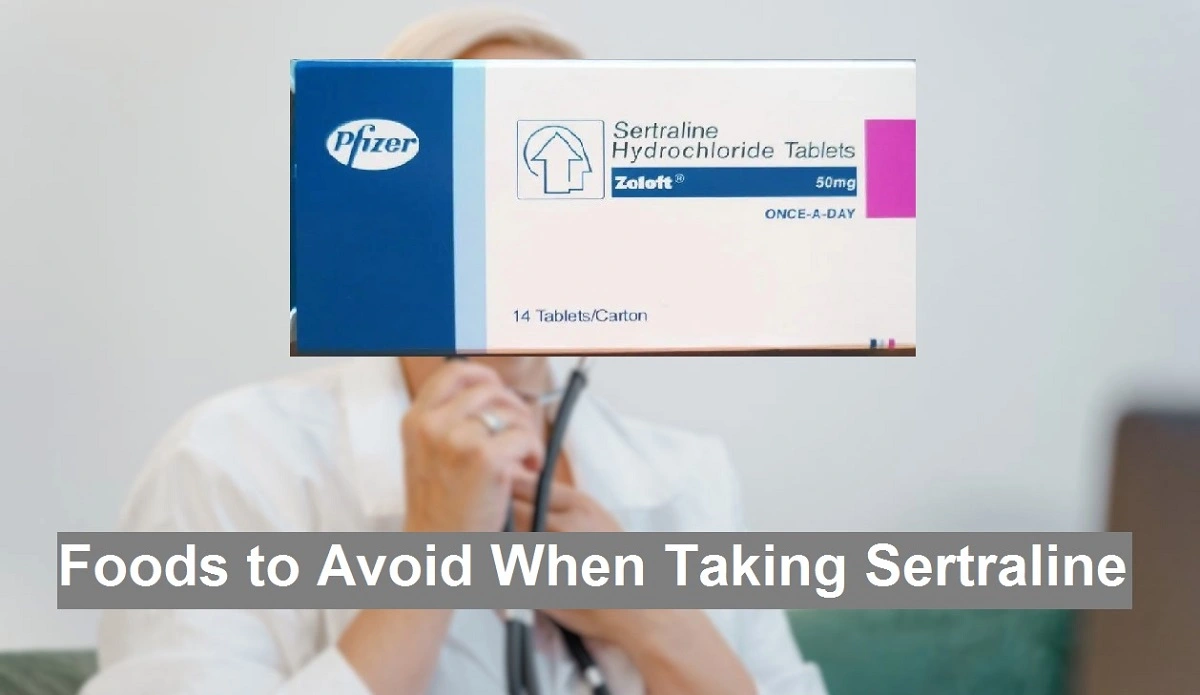Are you taking Sertraline? Do you want to know What Foods to Avoid When Taking Sertraline? As with many medications, certain foods must be avoided when taking sertraline, to ensure its effectiveness. People who are taking Sertraline must know what foods should not be eaten while taking Sertraline.
Sertraline is commonly known by its brand name “Zoloft”. As an antidepressant, sertraline is a member of the selective serotonin reuptake inhibitor (SSRI) class of medications. Serotonin is a happy chemical that acts as a messenger in our brain. Sertraline is a commonly prescribed medication used to treat depression, anxiety, and other mental health conditions.
Important Article – List of foods rich in vitamin D
20 Foods to Avoid When Taking Sertraline
What should you avoid when taking sertraline? Some foods may interfere with the absorption and effectiveness of sertraline, potentially causing adverse effects or decreased effectiveness. Here are 20 foods to avoid when taking sertraline to make sure your treatment works faster:
1. Grapefruit:
Grapefruit and its juice contain compounds that can interfere with sertraline metabolism, leading to higher blood levels of the drug.
2. Highly caffeinated beverages:
Excessive caffeine intake may increase anxiety and interfere with sleep patterns, which may counteract the benefits of sertraline.
3. Tyramine-rich foods:
Tyramine is found in aged, fermented, or preserved foods such as aged cheese, cured meats, and some fermented products. Taking these foods together with sertraline can cause a dangerous increase in blood pressure.
4. St. John’s Wort:
Although technically an herbal supplement rather than a food, St. John’s wort can interact with sertraline and other antidepressants, reducing their effectiveness or causing adverse reactions.
5. Soy products:
Soy contains compounds called isoflavones that may interfere with the absorption of sertraline in the body. It is best to limit soy consumption or consult a healthcare professional for personalized advice.
6. Licorice:
Licorice root contains glycyrrhizin, which may affect the metabolism of some drugs, including sertraline. High consumption of licorice should be avoided.
7. Excessive salt:
High-sodium foods can contribute to high blood pressure, which can increase some of the side effects of sertraline.
8. Fava beans:
Fava beans contain a compound called levodopa, which can interact with sertraline and potentially cause serotonin syndrome, a rare but serious condition.
9. Monoamine Oxidase Inhibitors (MAOIs):
Although not a food item, it is extremely important to avoid foods high in tyramine when taking sertraline or other SSRIs if you are on an MAOI. These include aged cheeses, cured meats and fermented foods.
10. Artificial sweeteners:
Some artificial sweeteners, such as aspartame, saccharin, and sucralose can affect neurotransmitter levels in the brain and potentially interact with sertraline.
11. High-fat meals:
Taking a high-fat meal simultaneously as sertraline may delay its absorption and decrease its effectiveness. Choose lighter, healthier options instead.
12. Processed foods:
Processed foods often contain high levels of sodium, unhealthy fats, and additives that can negatively impact mental health and interfere with the effectiveness of sertraline.
13. Too much sugar:
High sugar intake can cause fluctuations in blood sugar levels, which can exacerbate mood swings and interfere with the therapeutic effects of sertraline.
14. Trans fats:
Trans fats, commonly found in fried and processed foods, can cause inflammation in the body and interfere with serotonin production and absorption.
15. Aged meats:
Like aged cheeses, certain aged or cured meats contain high levels of tyramine, which can cause a dangerous interaction when combined with sertraline.
16. Pickled or fermented foods:
These foods, including pickles, sauerkraut, and kimchi, may contain high levels of tyramine and should be eaten with caution or avoided entirely.
17. Caffeine-rich chocolate:
Although moderate consumption of dark chocolate may have some health benefits, its caffeine content can potentially interact with sertraline and increase anxiety symptoms.
18. Shellfish:
Some types of shellfish, especially oysters and clams, contain high levels of tyramine and should be avoided or limited when taking sertraline.
19. Excessive herbal teas:
Some herbal teas may have psychoactive effects or contain compounds that may interact with sertraline. It is essential to research specific herbal teas and consult a healthcare professional if unsure.
20. Alcohol:
It is recommended to limit or avoid alcohol consumption when taking sertraline. Alcohol can increase the side effects of the drug and reduce its effectiveness.
Related Article – How to Flush Vitamin D out of System Naturally?
However, sertraline can be very effective in treating a variety of mental health conditions. However, it’s crucial to be aware of dietary choices that can affect its effectiveness and safety.
What are the side effects of Sertraline?
Sertraline, which is commonly used to treat central nervous system disorders, has some common side effects.
The main side effects are:
- Sexual Adverse Reactions: Decreased libido and sex drive, ejaculation problems and lack of intimacy.
- Gastrointestinal problems such as diarrhea, loss of appetite, painful bowel movements and constipation.
- Anger and aggression.
- Feelings of drowsiness, weakness (due to loss of appetite) and weight loss.
- Emotional eating leads to weight gain.
- Insomnia or oversleeping.
- excessive sweating.
Can I eat bananas with sertraline?
sertraline and bananas do not interact with each other. It is safe to eat bananas when you are taking sertraline.
Can I eat tea with sertraline?
Sertraline and tea do not interact directly. However, it is important to remember that caffeine, which is commonly found in tea, can potentially interact with sertraline and increase some side effects such as jitteriness, restlessness, or difficulty sleeping. Some individuals may also find that caffeine affects their anxiety levels.
